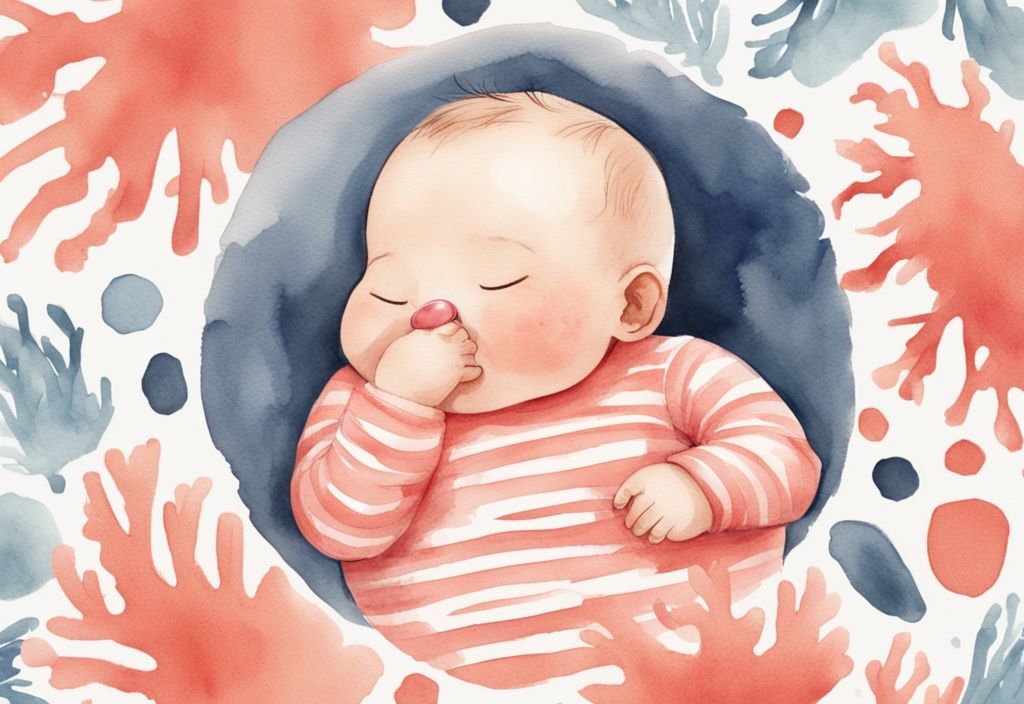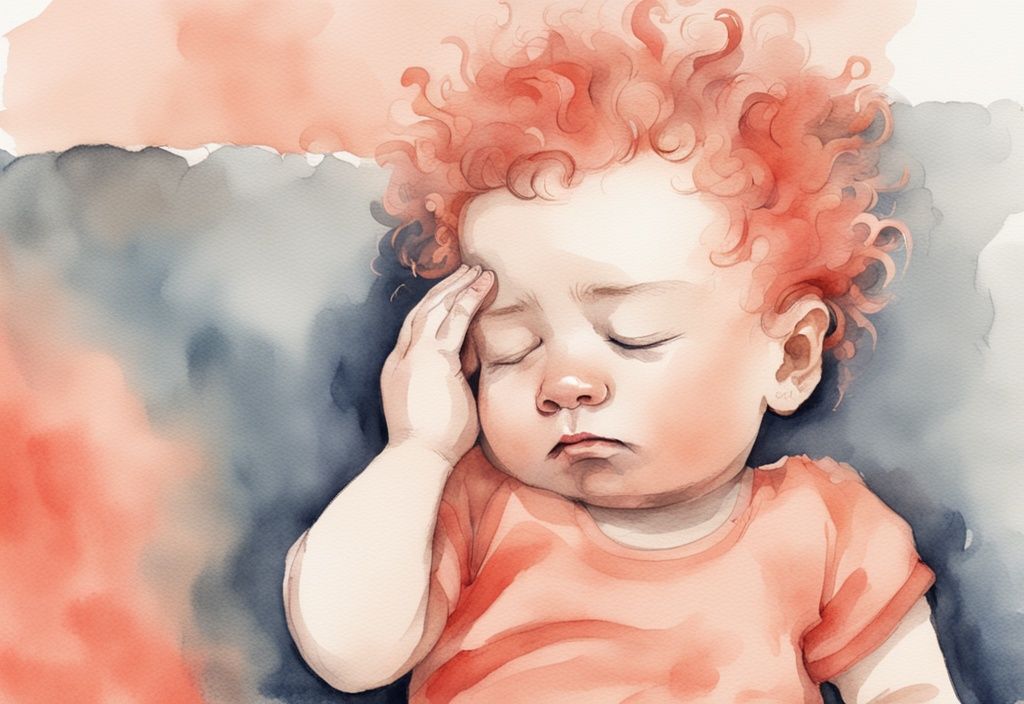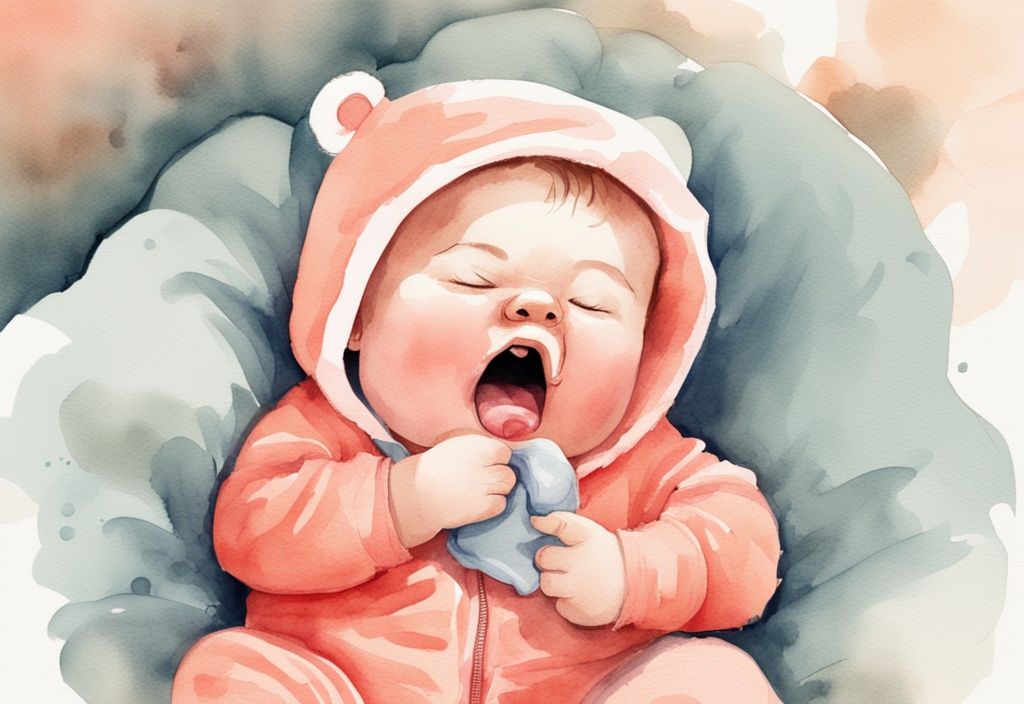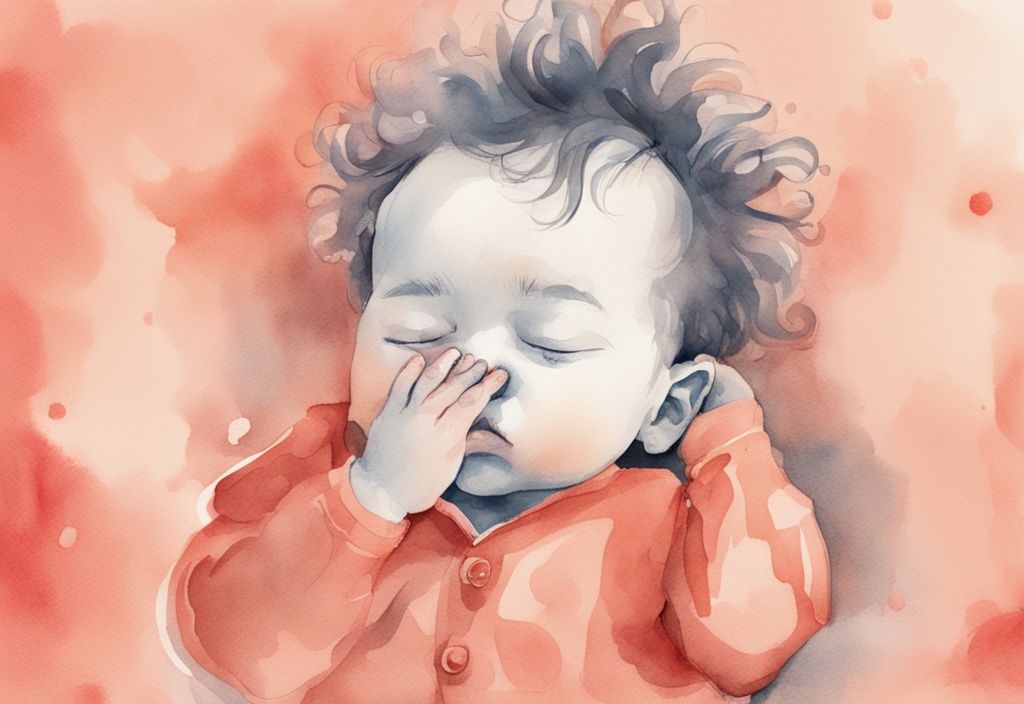Oh, friend, have you been worried over your baby scratching his head when he’s sleepy? I want you to know you’re not alone. Many babies do this, and there’s a good chance it’s something quite simple, maybe even just a self-soothing habit.
In this article, we’ll comb through the common reasons behind this behavior, such as skin conditions like cradle cap or eczema. We’ll also delve into ways that you can offer a helping hand to your little one.
As we journey through this topic, my aim is to equip you with practical tips to lessen head scratching and, in turn, gift your bundle of joy with peaceful sleep. We’re in this together, after all.
Understanding Why Babies Scratch Their Heads When Sleepy
When your baby is scratching his head when sleepy, it can be concerning even though it’s usually harmless. This behavior is often a self-soothing mechanism, providing comfort as your little one settles down for sleep. It’s part of a broader range of self-soothing behaviors that babies display during times of restlessness.
Sleepiness and Self-Soothing Behaviors
You might notice your baby scratching his head as he transitions from light to deeper sleep. This fidgeting and scratching often become more prominent in the lighter stages of sleep. During these moments, babies might scratch their heads to get comfortable and self-soothe. The act of rubbing and scratching their heads can sometimes appear as an expression of frustration as they wind down and drift off.
Moro Reflex: Natural Automatic Movements in Babies
The Moro reflex, or startle reflex, could also be a reason why your baby is scratching his head when sleepy. This reflex is an involuntary reaction where babies suddenly jerk their hands towards their faces when startled, a response that is part of a range of newborn reflexes that occur automatically without the baby trying. It’s most noticeable in the first few months and gradually fades away between three to six months.
During these startle responses, your baby’s hands might inadvertently reach his head, leading to scratching. While this reflex is a normal developmental phase, the associated head-scratching can be quite common until your baby gains better control over his movements.
Cradle Cap: A Common Baby Skin Condition
Another potential cause for head scratching is cradle cap. This common skin condition in babies is characterized by crusty, yellow, or brown scales on the scalp, which can be itchy and uncomfortable. This itchiness can provoke your baby to scratch his head frequently, especially when he is tired and less distracted.
Managing cradle cap effectively is crucial for reducing the scratching. Often, cradle cap resolves on its own, but gentle care with mild shampoos and soft brushing can help manage symptoms and provide relief. Understanding and addressing these needs will make this phase easier for both you and your baby.
Invalid YouTube video ID
If your baby’s head-scratching seems excessive or causes concern, it’s always good to consult your pediatrician to rule out any other underlying issues. Remember, parenting is full of these little puzzles, and you’re doing an amazing job figuring them out.
Relief Measures for a Baby Scratching His Head When Sleepy
Addressing a baby scratching his head due to overtiredness or skin conditions involves implementing calming techniques and choosing appropriate skincare products. These measures can help soothe the baby and reduce discomfort.

Soothing Techniques for Overtiredness and Discomfort
When a baby is overtired, falling asleep becomes a challenge and often leads to increased scratching. To alleviate this, you can try employing various soothing techniques. Swaddling, for instance, creates a snug environment that can calm your little one. If you’re interested in new and exciting opportunities, consider exploring how to get your baby into modeling as a fun activity for both you and your child. Gentle rocking or using white noise machines also offer a comforting backdrop, easing your baby’s transition to sleep.
Another effective approach is minimizing interactions. Keeping the room dimly lit and addressing your baby’s needs quietly can help prevent overstimulation. By intervening only when necessary, you allow your baby to develop self-soothing skills, which helps them settle back to sleep independently and reduces the likelihood of waking up habitually for attention.
Choosing the Right Baby Skin Products
Choosing appropriate skincare products is essential to minimize scratching caused by skin irritation. Moisturizing creams or anti-itch balms can provide relief if your baby is uncomfortable due to dry or irritated skin. Establishing a consistent bedtime skincare routine that includes the application of emollients helps maintain skin hydration, reducing the tendency to scratch.
Soothing Creams and Emollients
For more severe skin conditions, parents may need to use prescribed topical steroid creams. Always use these under the guidance of a healthcare professional to ensure safety and effectiveness in managing skin irritation.
Managing Dry Skin and Eczema in Babies
Dry skin and eczema are common conditions that can make a baby itch and scratch their head. In newborns, dry or peeling skin is usually part of their natural adaptation to life outside the womb but can still cause discomfort.
To manage these conditions, regular moisturizing with gentle, hypoallergenic products specifically designed for babies is crucial. These products help soothe the skin and prevent it from becoming too dry. Implementing a daily skincare routine that includes moisturizing after baths can keep the skin supple and less prone to irritation.
Tips to Prevent Baby’s Head Scratching
Helping your little one avoid head scratching while sleepy is essential for their comfort and well-being. There are several simple and effective techniques that can make a big difference.
Regular Nail Trimming: Maintaining Baby’s Hand Hygiene
Baby nails grow rapidly and are surprisingly sharp, often leading to incidental scratches on their head, especially when they are trying to soothe themselves to sleep. To prevent your baby from scratching his head when sleepy, it’s essential to regularly trim their nails. The most opportune times for this task are when the baby is in a calm state, such as during feeding or while they are asleep. If trimming feels daunting, gently filing your baby’s nails can be an effective alternative, reducing the chances of injury and maintaining their hand hygiene.
Protecting Baby’s Skin: Mittens and Proper Swaddling Techniques
To prevent a baby from scratching his head when sleepy, consider using mittens or baby socks to cover their hands. This is particularly useful during sleep, when reflexes can cause unintentional movements. Another effective method is swaddling, especially in the first few months of life. Proper swaddling techniques help keep the baby’s arms securely at their sides, minimizing the risk of face scratching. Additionally, implementing sleep mittens at night can further reduce excessive scratching, ensuring the baby remains comfortable and allowing for uninterrupted sleep.

How to Minimize Skin Irritation: Fabrics and Detergents
Minimizing skin irritation is crucial in preventing a baby from scratching his head when sleepy. Opting for soft, breathable fabrics like cotton or bamboo for clothing, bedding, and blankets can significantly reduce skin irritation. Before using new baby items, wash them to remove any potential irritants or residues that might cause discomfort. Additionally, avoid harsh detergents; instead, choose fragrance-free and hypoallergenic options to ensure your baby’s skin remains soothed and irritation-free. These measures collectively create a more comfortable sleep environment, reducing the likelihood of head scratching.
When Head Scratching Requires a Pediatrician’s Consultation
Sometimes, our little ones need more help than we can provide at home. Understanding when it’s time to reach out to a pediatrician can make all the difference. Let’s dive into some signs and symptoms that might need professional attention.
Signs of Persistent or Aggressive Scratching
When the baby is scratching his head when sleepy consistently and with intensity, it’s worth paying extra attention. This may not just be a quirky habit but potentially a sign of an underlying issue. Observing this behavior is crucial, so consider keeping a monitor on your baby’s sleep patterns. Significant changes in their sleep or more frequent, intense scratching during sleepless nights might indicate something more serious that needs to be checked by a healthcare professional.
Redness, Scaling, or Infections: When to Worry
Noticing redness, scaling, or signs of infection on your baby’s head can be unsettling. If your baby is scratching his head when sleepy and these symptoms appear, a visit to the pediatrician is essential. These signs could point to conditions that go beyond simple self-comforting, possibly hinting at allergies or skin infections.
Be mindful of persistent crying or any blood from scratching, as these could suggest significant skin discomfort or an underlying issue. Addressing these symptoms early with a pediatrician ensures timely diagnosis and treatment, ultimately aiming to provide your baby with the relief they need and prevent further complications.

FAQ
In the following section, we’ll explore why your baby is scratching his head when sleepy and how you can help alleviate it. We’ll also cover when it’s essential to consult a doctor.
Why does my baby scratch their head more when sleepy?
It’s common for babies to scratch their heads when they’re sleepy. This often acts as a self-soothing behavior during those sleep transitions. However, it can also be triggered by restlessness or discomfort. Sometimes, environmental factors like itchy clothing, uncomfortable sleeping positions, or overheated rooms can contribute to this behavior.
How can I alleviate my baby’s head scratching?
To prevent your baby from scratching his head when sleepy, there are several steps you can take:
- Regularly trim their nails to prevent scratches.
- Consider using mittens or soft gloves.
- Swaddle your baby to keep their hands contained and calm.
- Moisturize the scalp with baby-friendly products to reduce dryness and irritation.
In addition, incorporating soothing techniques like gentle rocking, playing soft white noise, or patting them gently can also help your little one feel more comfortable and less inclined to scratch.
When should I consult a doctor regarding my baby’s head scratching?
It’s important to consult a doctor if the scratching becomes persistent or aggressive. Look out for signs like redness, scaling, blood, or if your baby is persistently crying. If over-the-counter measures and home remedies don’t seem to help, professional advice will be necessary.
Conclusion
Babies scratching their heads when sleepy is a common and usually harmless behavior. Often, it’s associated with self-soothing techniques, the Moro reflex, or skin issues like cradle cap and eczema. Understanding these causes can really help in managing the situation effectively.
It’s all about prevention. Regularly trimming those tiny nails is essential since their nails grow at lightning speed and can easily scratch their delicate skin. And let’s not forget good skincare routines—keeping their skin moisturized and using hypoallergenic products can soothe any irritation that might trigger scratching. Choosing soft, breathable fabrics like cotton or bamboo for your baby’s clothes and bedding can also reduce discomfort.
Keep an eye out for persistent or aggressive scratching. This could be a signal of something more serious, like significant skin irritation or infection. If you notice symptoms like redness, scaling, or relentless crying, it’s a good idea to consult your pediatrician to prevent any complications.
Creating a cozy sleep environment is key. Techniques like swaddling, using mittens, and ensuring a quiet, dark, cool space can make a world of difference. Not only do these methods help reduce scratching, but they also support better sleep quality for both the baby and the parents. Prioritizing these strategies ensures a restful and soothing sleep experience for your little one.

